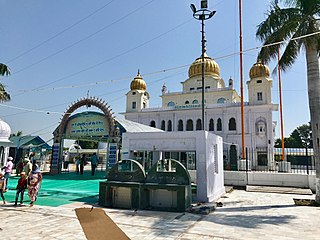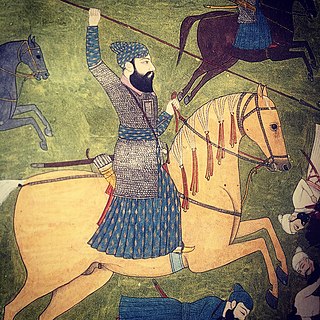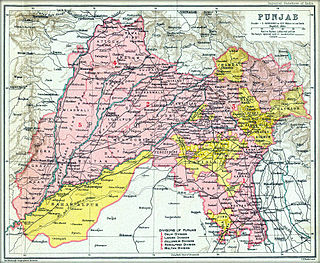
Fatehgarh Sahib is a city and a sacred pilgrimage site of Sikhism in the north west Indian state of Punjab. It is the headquarters of Fatehgarh Sahib district, located about 5 kilometres (3.1 mi) north of Sirhind. Fatehgarh Sahib is named after Fateh Singh, the 7-year-old son of Guru Gobind Singh, who was seized and buried alive, along with his 9-year-old brother Zoravar Singh, by the Mughals under the orders of governor Wazir Khan during the ongoing Mughal-Sikh wars of the early 18th century. The town experienced major historical events after the martyrdom of the sons in 1705, with frequent changes of control between the Sikhs and Mughals.
Samana is a town and a municipal council, nearby Patiala City in Patiala district in the Indian state of Punjab.

Sirhind-Fategarh is a town and a municipal council in the Fatehgarh Sahib district in the Indian state of Punjab.
Kotla Suleman is a small village in Sirhind, Fatehgarh Sahib district, Punjab, India. It is located 2 kilometres to the south of the district headquarters, Fatehgarh Sahib, and 45 kilometres from the state capital, Chandigarh.

Punjab has a long history of education.
Baba Banda Singh Bahadur Polytechnic College (BBSBPC), Fatehgarh Sahib, Punjab, India was established in 2006 by the Baba Banda Singh Bahadur Educational Trust formed under the patronage of Shiromani Gurdwara Parbandhak Committee with the approval of the Government of Punjab.
Baba Moti Ram Mehra was a devoted disciple of Guru Gobind Singh who, disregarding the risk to his own life, managed to enter the Thanda Burj in a very dramatic manner and serve milk to Mata Gujri, Baba Zorawar Singh and Baba Fateh Singh, the two younger Sahibzadas (sons) of Guru Gobind Singh for three nights, where they were kept under arrest by the Mughal Governor of Sirhind, Wazir Khan.

The Fateh Burj, a prominent tourist site in Punjab and the tallest victory tower in India, is situated in the historical village of Chappar Chiri in the SAS Nagar district of Punjab state. It was completed in 2011. The 328 feet (100 m) tower is dedicated to establishment of the Sikh Misls in a large part of Punjab in 1711. It is situated in Banda Singh Bahadur Road. It is situated just outside Mohali, a 140kilometres from Amritsar and 20 km from Sirhind. It was here that Banda Singh Bahadur, one of the most respected and great Sikh warriors, won a decisive battle against Wazir Khan, commander of the Mughal army.

Banda Singh Bahadur, was a Sikh warrior and a general of the Khalsa Army. At age 15, he left home to become an ascetic, and was given the name Madho Das Bairagi. He established a monastery at Nānded, on the bank of the river Godāvarī. In 1707, Guru Gobind Singh accepted an invitation to meet Mughal Emperor Bahadur Shah I in southern India, he visited Banda Singh Bahadur in 1708. Banda became disciple of Guru Gobind Singh and was given a new name, Gurbaksh Singh(as written in Mahan Kosh), after the baptism ceremony. He is popularly known as Banda Singh Bahadur. He was given five arrows by the Guru as a blessing for the battles ahead. He came to Khanda, Sonipat and assembled a fighting force and led the struggle against the Mughal Empire.
Lohgarh is a historic town in Bilaspur tehsil of Yamunanagar district of Haryana in India. It was the capital of First Sikh State under Baba Banda Singh Bahadur from 1710 to 1716.

Binod Singh, a Trehan Khatri and a descendant of Guru Angad, was an army man and disciple of Guru Gobind Singh and was among few Sikhs who accompanied him to Nanded in 1706. In Budha Dal Chronicles, Guru Gobind Singh made Baba Binod Singh the head of the Khalsa.

The State of Malerkotla or Maler Kotla was established by Maharaja of Parmar Rajputs, is a princely state in the Punjab region since the era of British India. Which was taken over by Sarwani and Lodi Pashtun dynasty from Afghanistan, and named Malerkotla as capital.

Baba Baj Singh, also known as Baj Bahadur, was a Sikh general, governor, scholar and martyr from present-day India.

The Battle of Chappar Chiri, also called Battle of Sirhind, was fought between Mughal Empire and the Sikhs on 12 May 1710 at Chappar Chiri, located 20 kilometers from Sirhind.
Khanda is a big & historical village in Kharkhoda tehsil of Sonipat district in Haryana, India. It is located 2 miles (3.2 km) from Kharkhoda and 7 miles (11 km) from Sonipat. It is a part of the Delhi NCR. Khanda has two Gram Panchayats Khanda Khas & Khanda Alman. Two Sarpanchs elects from the village in every five years. Khanda is the head of 12 villages of Dahiya Khap mainly known as.

Fateh Singh was a warrior in Sikh history. He is known for beheading Wazir Khan who was the Mughal Governor of Sirhind, administering a territory of the Mughal Empire between the Sutlej and Yamuna rivers. Wazir Khan was infamous for ordering the execution of the two young sons of Guru Gobind Singh, Sahibzada Fateh Singh and Sahibzada Zorawar Singh in 1704.
Banda Singh Bahadur's invasion of the Hill States was a Sikh military invasion of the Hill States.










